江苏高考英语真题任务型阅读2008-2013
- 格式:doc
- 大小:506.92 KB
- 文档页数:12

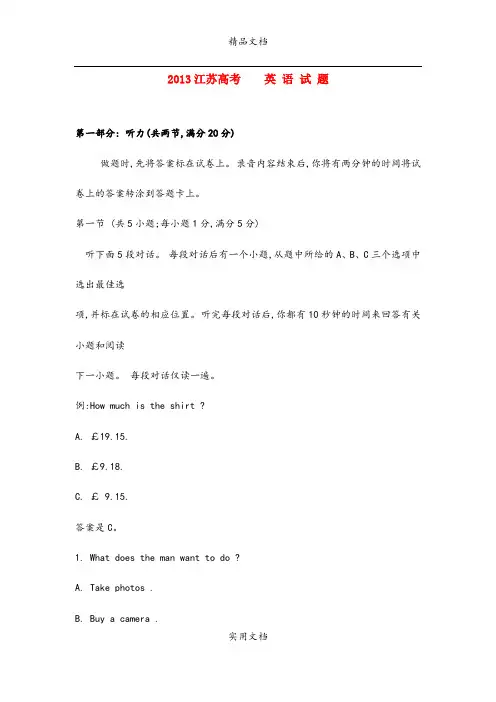
2013江苏高考英语试题第一部分: 听力(共两节,满分20分)做题时,先将答案标在试卷上。
录音内容结束后,你将有两分钟的时间将试卷上的答案转涂到答题卡上。
第一节 (共5小题;每小题1分,满分5分)听下面5段对话。
每段对话后有一个小题,从题中所给的A、B、C三个选项中选出最佳选项,并标在试卷的相应位置。
听完每段对话后,你都有10秒钟的时间来回答有关小题和阅读下一小题。
每段对话仅读一遍。
例:How much is the shirt ?A. £19.15.B. £9.18.C. £ 9.15.答案是C。
1. What does the man want to do ?A. Take photos .B. Buy a camera .C. Help the woman.2. What are the speakers talking about ?A. A noisy night .B. Their life in town .C. A place of living.3. Where is the man now ?A. On his way.B. In a restaurant .C. At home.4. What will Celia do ?A. Find a player .B. Watch a game.C. Play basketball .5. What day is it when the conversation takes place?A. Saturday.B. Sunday.C. Monday.第二节 (共15小题;每小题1分,满分15分)听下面5段对话或独白。
每段对话或独白后有几个小题,从题中所给的A、B、C 三个选项中选出最佳选项,并标在试卷的相应位置。
听每段对话或独白前,你将有时间阅读各个小题,每小题5秒钟;听完后,各小题将给出5秒钟的作答时间。
每段对话或独白读两遍。
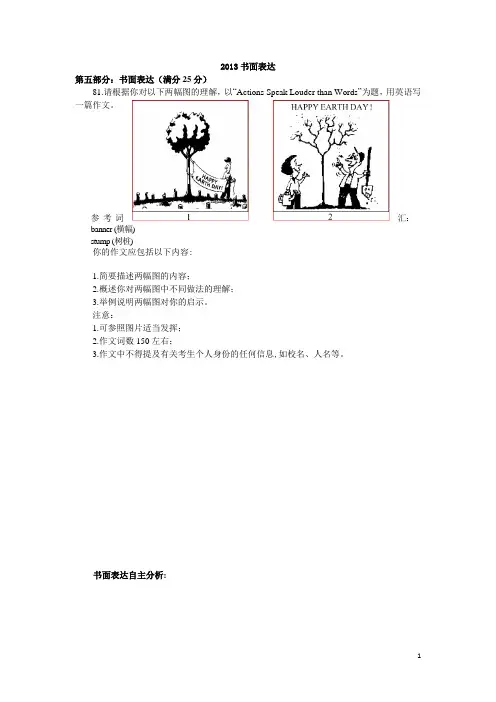
2013书面表达第五部分:书面表达(满分25分)81.请根据你对以下两幅图的理解,以“Actions Speak Louder than Words”为题,用英语写一篇作文。
参考词汇:banner (横幅)stump (树桩)你的作文应包括以下内容:1.简要描述两幅图的内容;2.概述你对两幅图中不同做法的理解;3.举例说明两幅图对你的启示。
注意:1.可参照图片适当发挥;2.作文词数150左右;3.作文中不得提及有关考生个人身份的任何信息,如校名、人名等。
__________________________________________________________________________ __________________________________________________________________________ __________________________________________________________________________ __________________________________________________________________________ __________________________________________________________________________ __________________________________________________________________________ __________________________________________________________________________ __________________________________________________________________________ __________________________________________________________________________ __________________________________________________________________________ __________________________________________________________________________ __________________________________________________________________________ __________________________________________________________________________ __________________________________________________________________________ __________________________________________________________________________书面表达自主分析:一2012江苏真题(图表提示类)81.生活中冲突是有发生。
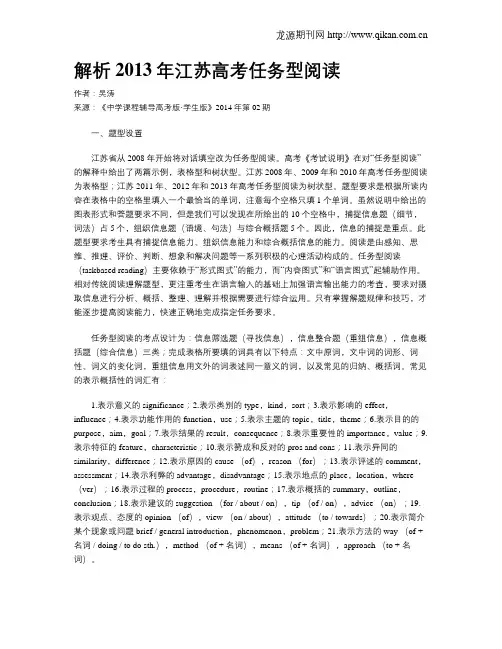
解析2013年江苏高考任务型阅读作者:吴涛来源:《中学课程辅导高考版·学生版》2014年第02期一、题型设置江苏省从2008年开始将对话填空改为任务型阅读。
高考《考试说明》在对“任务型阅读”的解释中给出了两篇示例,表格型和树状型。
江苏2008年、2009年和2010年高考任务型阅读为表格型;江苏2011年、2012年和2013年高考任务型阅读为树状型。
题型要求是根据所读内容在表格中的空格里填入一个最恰当的单词,注意每个空格只填1个单词。
虽然说明中给出的图表形式和答题要求不同,但是我们可以发现在所给出的10个空格中,捕捉信息题(细节,词法)占5个,组织信息题(语境、句法)与综合概括题5个。
因此,信息的捕捉是重点。
此题型要求考生具有捕捉信息能力、组织信息能力和综合概括信息的能力。
阅读是由感知、思维、推理、评价、判断、想象和解决问题等一系列积极的心理活动构成的。
任务型阅读(taskbased reading)主要依赖于“形式图式”的能力,而“内容图式”和“语言图式”起辅助作用。
相对传统阅读理解题型,更注重考生在语言输入的基础上加强语言输出能力的考查,要求对摄取信息进行分析、概括、整理、理解并根据需要进行综合运用。
只有掌握解题规律和技巧,才能逐步提高阅读能力,快速正确地完成指定任务要求。
任务型阅读的考点设计为:信息筛选题(寻找信息),信息整合题(重组信息),信息概括题(综合信息)三类;完成表格所要填的词具有以下特点:文中原词,文中词的词形、词性、词义的变化词,重组信息用文外的词表述同一意义的词,以及常见的归纳、概括词。
常见的表示概括性的词汇有:1.表示意义的significance;2.表示类别的type,kind,sort;3.表示影响的effect,influence;4.表示功能作用的function,use;5.表示主题的topic,title,theme;6.表示目的的purpose,aim,goal;7.表示结果的result,consequence;8.表示重要性的importance,value;9.表示特征的feature,characteristic;10.表示赞成和反对的pros and cons;11.表示异同的similarity,difference;12.表示原因的cause (of),reason (for);13.表示评述的comment,assessment;14.表示利弊的advantage,disadvantage;15.表示地点的place,location,where (ver);16.表示过程的process,procedure,routine;17.表示概括的summary,outline,conclusion;18.表示建议的suggestion (for / about / on),tip (of / on),advice (on);19.表示观点、态度的opinion (of),view (on / about),attitude (to / towards);20.表示简介某个现象或问题brief / general introduction,phenomenon,problem;21.表示方法的way (of + 名词 / doing / to do sth.),method (of + 名词),means (of + 名词),approach (to + 名词)。
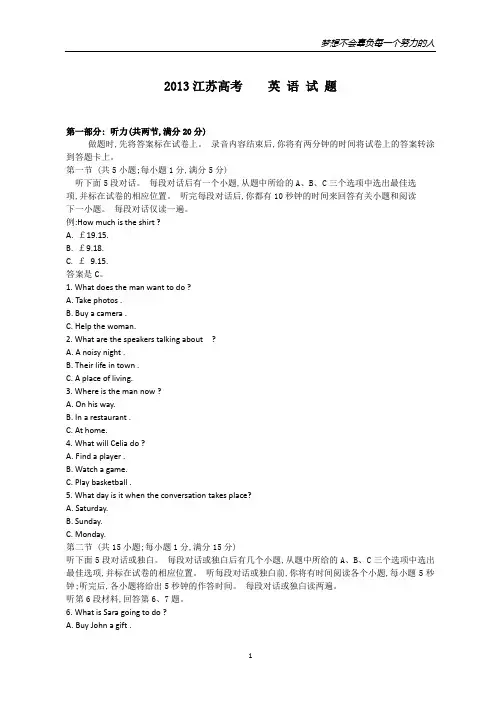
2013江苏高考英语试题第一部分: 听力(共两节,满分20分)做题时,先将答案标在试卷上。
录音内容结束后,你将有两分钟的时间将试卷上的答案转涂到答题卡上。
第一节 (共5小题;每小题1分,满分5分)听下面5段对话。
每段对话后有一个小题,从题中所给的A、B、C三个选项中选出最佳选项,并标在试卷的相应位置。
听完每段对话后,你都有10秒钟的时间来回答有关小题和阅读下一小题。
每段对话仅读一遍。
例:How much is the shirt ?A. £19.15.B. £9.18.C. £9.15.答案是C。
1. What does the man want to do ?A. Take photos .B. Buy a camera .C. Help the woman.2. What are the speakers talking about ?A. A noisy night .B. Their life in town .C. A place of living.3. Where is the man now ?A. On his way.B. In a restaurant .C. At home.4. What will Celia do ?A. Find a player .B. Watch a game.C. Play basketball .5. What day is it when the conversation takes place?A. Saturday.B. Sunday.C. Monday.第二节 (共15小题;每小题1分,满分15分)听下面5段对话或独白。
每段对话或独白后有几个小题,从题中所给的A、B、C三个选项中选出最佳选项,并标在试卷的相应位置。
听每段对话或独白前,你将有时间阅读各个小题,每小题5秒钟;听完后,各小题将给出5秒钟的作答时间。
每段对话或独白读两遍。
听第6段材料,回答第6、7题。
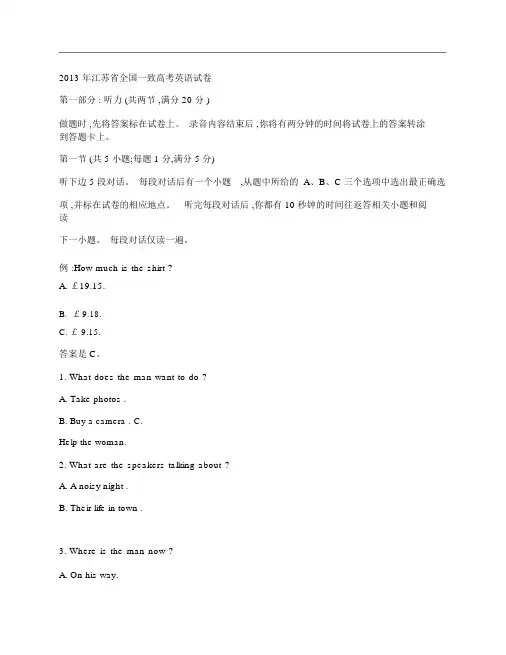
2013 年江苏省全国一致高考英语试卷第一部分 : 听力 (共两节 ,满分 20 分 )做题时 ,先将答案标在试卷上。
录音内容结束后 ,你将有两分钟的时间将试卷上的答案转涂到答题卡上。
第一节 (共 5 小题;每题 1 分,满分 5 分)听下边 5 段对话。
每段对话后有一个小题,从题中所给的 A、B、C 三个选项中选出最正确选项 ,并标在试卷的相应地点。
听完每段对话后 ,你都有 10 秒钟的时间往返答相关小题和阅读下一小题。
每段对话仅读一遍。
例 :How much is the shirt ?A. £19.15.B. £9.18.C. £ 9.15.答案是 C。
1.What does the man want to do ?A. Take photos .B. Buy a camera .C.Help the woman.2.What are the speakers talking about ?A. A noisy night .B. Their life in town .3.Where is the man now ?A. On his way.B. In a restaurant .C. At home.4.What will Celia do ?A. Find a player .B. Watch a game.C. Play basketball .5.What day is it when the conversation takes place?A. Saturday.B. Sunday.C. Monday.第二节 (共 15 小题;每题 1 分,满分 15 分)听下边 5 段对话或独白。
每段对话或独白后有几个小题 ,从题中所给的 A、 B、C 三个选项中选出最正确选项 ,并标在试卷的相应地点。
听每段对话或独白前 ,你将有时间阅读各个小题 , 每题 5 秒钟 ;听完后 ,各小题将给出 5 秒钟的作答时间。
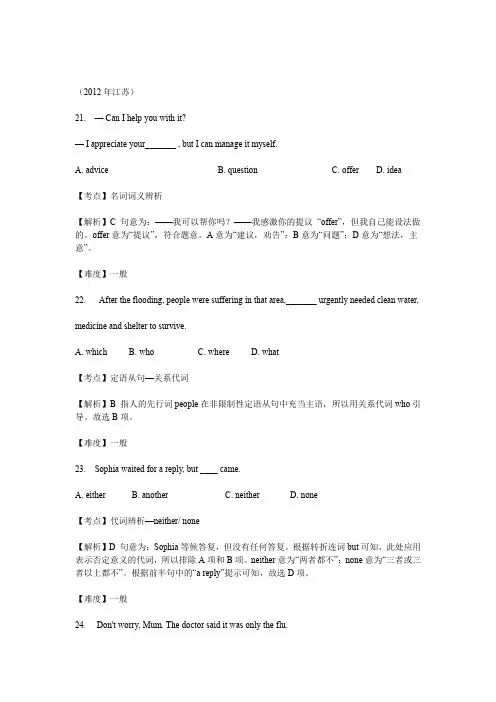
(2012年江苏) 21. — Can I help you with it? — I appreciate your_______ , but I can manage it myself. A. advice B. question C. offer D. idea 【考点】名词词义辨析 【解析】C 句意为:——我可以帮你吗?——我感激你的提议 “offer”,但我自己能设法做的。offer意为“提议”,符合题意。A意为“建议,劝告”;B意为“问题”;D意为“想法,主意”。
【难度】一般 22. After the flooding, people were suffering in that area,_______ urgently needed clean water, medicine and shelter to survive. A. which B. who C. where D. what 【考点】定语从句—关系代词 【解析】B 指人的先行词people在非限制性定语从句中充当主语,所以用关系代词who引导。故选B项。
【难度】一般 23. Sophia waited for a reply, but ____ came. A. either B. another C. neither D. none 【考点】代词辨析—neither/ none 【解析】D 句意为:Sophia等候答复,但没有任何答复。根据转折连词but可知,此处应用表示否定意义的代词,所以排除A项和B项。neither意为“两者都不”;none意为“三者或三者以上都不”。根据前半句中的“a reply”提示可知,故选D项。
【难度】一般 24. ---Don't worry, Mum. The doctor said it was only the flu. ---_______! I'll tell Dad there's nothing serious. A. What a relief B. Congratulations C. How surprising D. I'm so sorry 【考点】交际用语—安慰 【解析】A 句意为:——妈妈,别担心。医生说只是流感。——我可以松口气了。我要告诉爸爸没有什么严重的。A项意为“可以松口气了”,符合语境。B项意为“祝贺”;C项意为“多么令人惊讶啊”;D项意为“我很抱歉”。根据句意,应选A项。
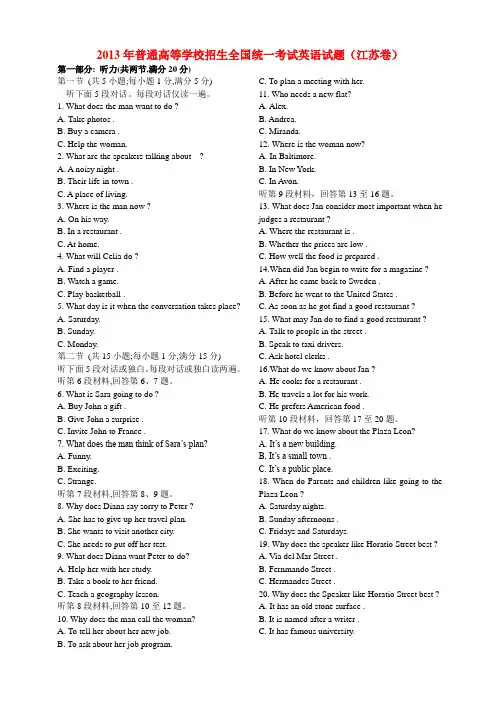
2013年普通高等学校招生全国统一考试英语试题(江苏卷)第一部分: 听力(共两节,满分20分)第一节(共5小题;每小题1分,满分5分)听下面5段对话。
每段对话仅读一遍。
1. What does the man want to do ?A. Take photos .B. Buy a camera .C. Help the woman.2. What are the speakers talking about ?A. A noisy night .B. Their life in town .C. A place of living.3. Where is the man now ?A. On his way.B. In a restaurant .C. At home.4. What will Celia do ?A. Find a player .B. Watch a game.C. Play basketball .5. What day is it when the conversation takes place?A. Saturday.B. Sunday.C. Monday.第二节(共15小题;每小题1分,满分15分)听下面5段对话或独白。
每段对话或独白读两遍。
听第6段材料,回答第6、7题。
6. What is Sara going to do ?A. Buy John a gift .B. Give John a surprise .C. Invite John to France .7. What does the man think of Sara’s plan?A. Funny.B. Exciting.C. Strange.听第7段材料,回答第8、9题。
8. Why does Diana say sorry to Peter ?A. She has to give up her travel plan.B. She wants to visit another city.C. She needs to put off her test.9. What does Diana want Peter to do?A. Help her with her study.B. Take a book to her friend.C. Teach a geography lesson.听第8段材料,回答第10至12题。

2013年江苏省高考英语试卷及答案2013年普通高等学校招生统一考试(江苏卷)英语试题第一部分:听力(共两节,满分 20 分)做题时,先将答案标在试卷上。
录音内容结束后,你将有两分钟的时间将试卷上的答案转涂到答题卡上。
第一节(共 5 小题;每小题 1 分,满分 5 分)听下面 5 段对话。
每段对话后有一个小题,从题中所给的 A、B、C 三个选项中选出最佳选项,并标在试卷的相应位置。
听完每段对话后,你都有10秒钟的时间来回答有关小题和阅读下一小题。
每段对话仅读一遍。
例: How much is the shirt?A. ₤19.15B. ₤9.18C. ₤9.15答案是 C。
(A)1.What does the man want to do?A. Take photos.B. Buy a camerA.C. Help the woman.(C)2.What are the speakers talking about?A. A noisy nightB. Their life in town.C. A place of living.(A)3.Where is the man now?A. On his way.B. In a restaurant.C. At home.(C)4.What will Celia do?A. Find a player.B. Watch a game.C. Play basketball.(B)5.What day is it when the conversation takes place?A. Saturday.B. Sunday.C. Monday.第二节(共15小题;每小题1.5分,满分22.5分)听下面5段对话或独白。
每段对话或独白后有几个小题,从题中所给的A、B、C三个选项中选出最佳选项,并标在试卷的相应位置。
听每段对话或独白前,你将有时间阅读各个小题,每小题5秒钟;听完后,各小题将给出5秒钟的作答时间。
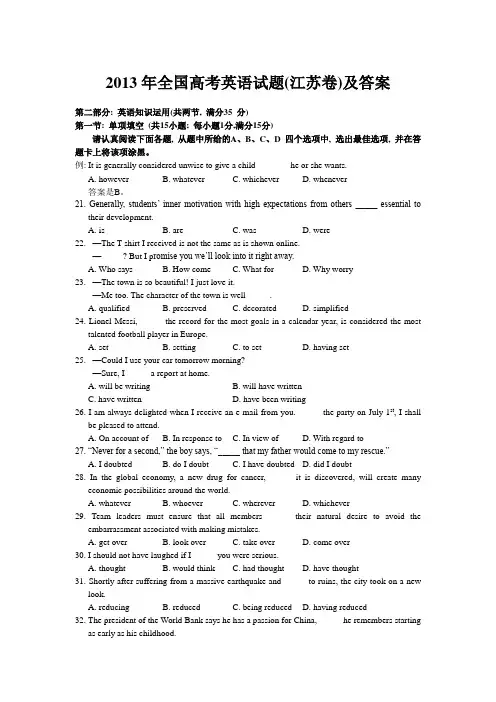
2013年全国高考英语试题(江苏卷)及答案第二部分: 英语知识运用(共两节, 满分35 分)第一节: 单项填空(共15小题; 每小题1分,满分15分)请认真阅读下面各题, 从题中所给的A、B、C、D 四个选项中, 选出最佳选项, 并在答题卡上将该项涂黑。
例: It is generally considered unwise to give a child _______ he or she wants.A. howeverB. whateverC. whicheverD. whenever答案是B。
21. Generally, students’ inner motivation with high expectations from others _____ essential totheir development.A. isB. areC. wasD. were22. —The T-shirt I received is not the same as is shown online.—_____? But I p romise you we’ll look into it right away.A. Who saysB. How comeC. What forD. Why worry23. —The town is so beautiful! I just love it.—Me too. The character of the town is well _____.A. qualifiedB. preservedC. decoratedD. simplified24. Lionel Messi, _____ the record for the most goals in a calendar year, is considered the mosttalented football player in Europe.A. setB. settingC. to setD. having set25. —Could I use your car tomorrow morning?—Sure, I _____ a report at home.A. will be writingB. will have writtenC. have writtenD. have been writing26. I am always delighted when I receive an e-mail from you. _____ the party on July 1st, I shallbe pleased to attend.A. On account ofB. In response toC. In view ofD. With regard to27. “Never for a second,” the boy says, “_____ that my father would come to my rescue.”A. I doubtedB. do I doubtC. I have doubtedD. did I doubt28. In the global economy, a new drug for cancer, _____ it is discovered, will create manyeconomic possibilities around the world.A. whateverB. whoeverC. whereverD. whichever29. Team leaders must ensure that all members _____ their natural desire to avoid theembarrassment associated with making mistakes.A. get overB. look overC. take overD. come over30. I should not have laughed if I _____ you were serious.A. thoughtB. would thinkC. had thoughtD. have thought31. Shortly after suffering from a massive earthquake and _____ to ruins, the city took on a newlook.A. reducingB. reducedC. being reducedD. having reduced32. The president of the World Bank says he has a passion for China, _____ he remembers startingas early as his childhood.A. whereB. whichC. whatD. when33. With inspiration from other food cultures, American food culture can take a _____ for thebetter.A. shareB. chanceC. turnD. when34. —What about your self-drive trip yesterday?—Tiring! The road is being widened, and we _____ a round ride.A. hadB. haveC. would haveD. have had35. —Thank you for the flowers.—_____. I thought they might cheer you up.A. That’s rightB. All rightC. I’m all rightD. It’s all right第二节: 完形填空(共20小题; 每小题1 分, 满分20 分)请认真阅读下面短文, 从短文后各题所给的A、B、C、D 四个选项中, 选出最佳选项, 并在答题卡上将该项涂黑。
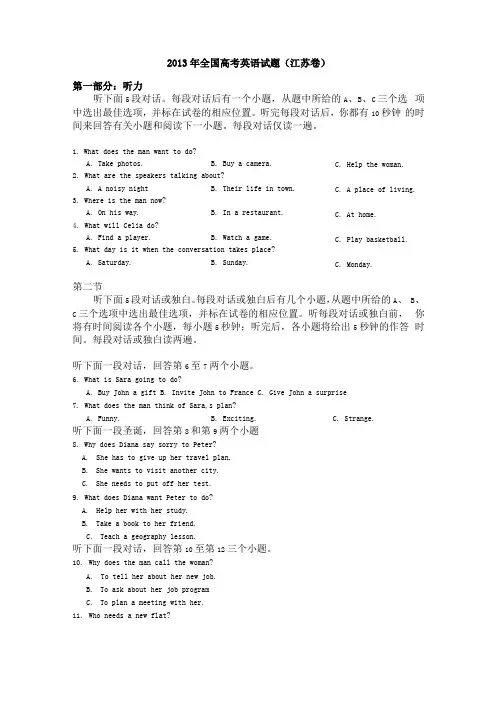
2013年全国高考英语试题(江苏卷)第一部分:听力听下面5段对话。
每段对话后有一个小题,从题中所给的A 、B 、C 三个选 项中选出最佳选项,并标在试卷的相应位置。
听完每段对话后,你都有10秒钟 的时间来回答有关小题和阅读下一小题。
每段对话仅读一遍。
1. What does the man want to do?A. Take photos.B. Buy a camera. 2. What are the speakers talking about?A. A noisy nightB. Their life in town. 3. Where is the man now?A. On his way.B. In a restaurant. 4. What will Celia do?A. Find a player.B. Watch a game. 5. What day is it when the conversation takes place? A. Saturday. B. Sunday. 第二节听下面5段对话或独白。
每段对话或独白后有几个小题,从题中所给的A 、 B 、C 三个选项中选出最佳选项,并标在试卷的相应位置。
听每段对话或独白前, 你将有时间阅读各个小题,每小题5秒钟;听完后,各小题将给出5秒钟的作答 时间。
每段对话或独白读两遍。
听下面一段对话,回答第6至7两个小题。
6. What is Sara going to do?A. Buy John a giftB. Invite John to FranceC. Give John a surprise7. What does the man think of Sara,s plan?A. Funny.B. Exciting.C. Strange.听下面一段圣诞,回答第8和第9两个小题8. Why does Diana say sorry to Peter?A. She has to give up her travel plan.B. She wants to visit another city.C. She needs to put off her test.9. What does Diana want Peter to do?A. Help her with her study.B. Take a book to her friend.C. Teach a geography lesson.听下面一段对话,回答第10至第12三个小题。
任务型阅读答案大全江苏英语高考卷2008-20182018.11.182008年江苏高考英语任务型阅读:71. teamwork 72. ideas / opinions / views / thoughts 73. Support / Encourage / Back74. Suggestions 75. given / assigned 76. responsibility77. topic / subject / issue 78. case 79. Exchange / Share 80. Evaluate2009年江苏高考英语任务型阅读:71.self-centred/subjective 72.involves 73.determine/define/know/understand 74.expectations/hopes/desires/wishes 75.occurs/happens/exists/arises 76.reading/understanding/knowing 77.behaviors/acts /action(s)/activities78.conveying/expressing 79.erase/remove/delete/change 80.can’t/cannot2010年江苏高考英语任务型阅读:71. swinging 72 .Based 73. migration 74 .even 75. experiments/tests/study/research 76. block 77. cloudy 78. discovery 79. north 80 .brain(s)2011年江苏高考英语任务型阅读:71. performance/act/activity 72. easy 73.properly/appropriately/successfully/rightly74. urgent 75. culture 76. growing/increasing/rising77. expected/supposed/required 78. public 79. likely 80. harm/damage2012年江苏高考英语任务型阅读:71. bother/ annoy 72. anxiety/ concern/ worry73. considerate/ aware/ conscious 74. loyal/ faithful/ devoted/ committed75. difference 76. positively77. success/ achievements 78. strongly79. determined/ decided 80. chances/ possibilities/ opportunities2013年江苏高考英语任务型阅读:71. strict 72. helpful/good 73. Functions/Roles/Importance/Significance74. running/working/going/operating/functioning 75. performance(s)76. fired/dismissed/jobless 77. problems/troubles 78.higher/subjective/unfair/unjust/prejudiced79. tense/damaged/poor/bad 80. discourage/affect/damage2014年江苏高考英语任务型阅读:71. feeling 72. influences 73. practical 74. unconsciously75. individuals 76. moral 77. spirit 78. habits79. independent 80. No2015年江苏高考英语任务型阅读:【答案】71.rewards/rewarded 72.Explanations 73.involvement 74.share75.threat 76.prepare 77.withdraw 78.profession(s)/intention79.adapt 80.depends2016年江苏高考英语任务型阅读:71. Internet 72. participates/joins 73. keeping 74. all/different/various 75. heart/core 76. check 77. judge 78. mixed/two 79. convenient 80. reduce2017年江苏高考英语任务型阅读:71. lower 72. size/scale 73. immediate 74. economic75. old/older 76. earlier 77. living/life 78. equality79. immigration 80. compensate2018年江苏高考英语任务型阅读:71. benefit 72. Ways 73. joint/collective 74. promotion/marketing 75. effect 76. fares 77. positive 78. outside/beyond79. statistics/data/analyses 80. alternative。
2013江苏卷第四部分:任务型阅读(共10小题;每小题1分,满分10分)请认真阅读下列短文,并根据所读内容在文章后表格中的空格里填入一.个.最恰当的单词。
注意:请将答案写在答题卡上相应题号的横线上。
每个空格只填一个单词。
Quiet Virtue: The ConscientiousThe everyday signs of conscientiousness (认真尽责)—being punctual, careful in doing work, self-disciplined, and scrupulous (一丝不苟的) in attending to responsibilities—are typical characteristics of the model organizational citizen, the people who keep things running as they should. They follow the rules, help out, and are concerned about the people they work with. It‘s the conscientious worker who helps newcomers or updates people who return after an absence, who gets to work on time and never abuses sick leaves, who always gets things done on deadline.Conscientiousness is a key to success in any field. In studies of job performance, outstanding effectiveness for almost all jobs, from semi-skilled labor to sales and management, depends on conscientiousness. It is particularly important for outstanding performance in jobs at the lower levels of an organization: the secretary whose message taking is perfect, the delivery truck driver who is always on time.Among sales representatives for a large American car manufacturer, those who were most conscientious had the largest volume of sales. Conscientiousness also offers a buffer (缓冲) against the threat of job loss in today‘s constantly changing market, because employees with this quality are among the most valued. For the sales representatives, their level of conscientiousness mattered almost as much as their sales in determining who stayed on.There is an air around highly conscientious people that makes them seem even better than they actually are. Their reputation for dependability influences managers‘ evaluations of their work, giving them higher evaluations than objective measures of their performance would predict.But conscientiousness in the absence of social skills can lead to problems. Since conscientious people demand so much of themselves, they can hold other people to their own standards, and so be overly judgmental whe n others don‘t show the same high levels of model behavior. Factory workers in Great Britain and the United States who were extremely conscientious, for example, tended to criticize co-workers even about failures that seemed unimportant to those they criticized, which damaged their relationships.When conscientiousness takes the form of living up to expectations, it can discourage creativity. In creative professions like art or advertising, openness to wild ideas and spontaneity (自发性) are scarce and in demand. Success in such occupations calls for a balance, however; without enough conscientiousness to follow through, people become mere dreamers, with nothing to show for their imaginativeness.题型自主分析:1、原词重现(信息查找):2、词性转换(信息加工):3、提炼概括(信息归纳):2012江苏卷第四部分: 任务型阅读(共10 小题;每小题1 分,满分10 分)请认真阅读下列短文,并根据所读内容在文章后表格中的空格里填入一个最恰当的单词。
注意:请将答案写在答题卡上相应题号的横线上。
每个空格只填一个单词。
Happiness Advantag e” EffectIn July 2010 Burt‘s Bees, a personal-care products company, was going through enormous change as it began a global expansion into 19 new countries. In this kind of high-pressure situation, many leaders bother their assistants with frequent meetings or flood their in-boxes with urgent demands. In doing so, managers lift everyone‘s anxiety level, which activates the part of the brain that processes threats and steals resources from the prefrontal cortex(大脑皮层), which is responsible for effective problem solving.Burt‘s Bees‘s then-CEO, John Wolfgang, took a different approach. Each day, he‘d send out an e-mail praising a team member for work related to global marketing. He‘d interrupt his own presentations to remind his managers to talk with their tea ms about the company‘s values. He asked me to further a three-hour session with employees on happiness in the course of the expansion effort. As one member of the senior team told me a year later, Wolfgang‘s emphasis on developing positive leadership kept his managers actively involved and loyal as they successfully transformed the company into a global one.That outcome shouldn't surprise us. Research shows that when people work with a positive mind-set(思维模式), performance on nearly every level--- productivity, creativity, involvement---improves. Yet happiness is perhaps the most misunderstood driver of performance. For one, most people believe that success comes before happiness. ―Once I get a promotion, I‘ll be happy,‖ they think. Or, ―Once I hit sales targe, I‘ll feel great.‖ But because success is a moving target—as soon as you hit your target, you raise it again ----- the happiness that results from success does not last long.In fact, it works the other way around: People who have a positive mind-set perform better in the face of challenge. I call this the ―happiness advantage‖ –every business outcome shows improvement when the brain is positive. I've observed this effect in my role as a researcher and lecturer in 48 countries on the connection between employee happiness and success. And I‘m not alone: In an analysis of 225 academic studies, researchers found strong evidence of cause-and-effect relationship between life satisfaction and successful business outcomes.Another common misunderstanding is that our genetics, our environment, or a combination of the two determines how happy we are. To be sure, both factors have an impact. But one‘s general sense of well-being is surprisingly unstable. The habits you form, the way you interact with colleagues, how you think about stress---all these can be managed to increase your happiness and your chances of success.题型自主分析:1、原词重现(信息查找):2、词性转换(信息加工):3、提炼概括(信息归纳):2011江苏卷第四部分:任务型阅读(共10小题;每小题1分,满分10分)请认真阅读下列短文,并根据所读内容在文章后表格中的空格里填入一个最恰当的单词。